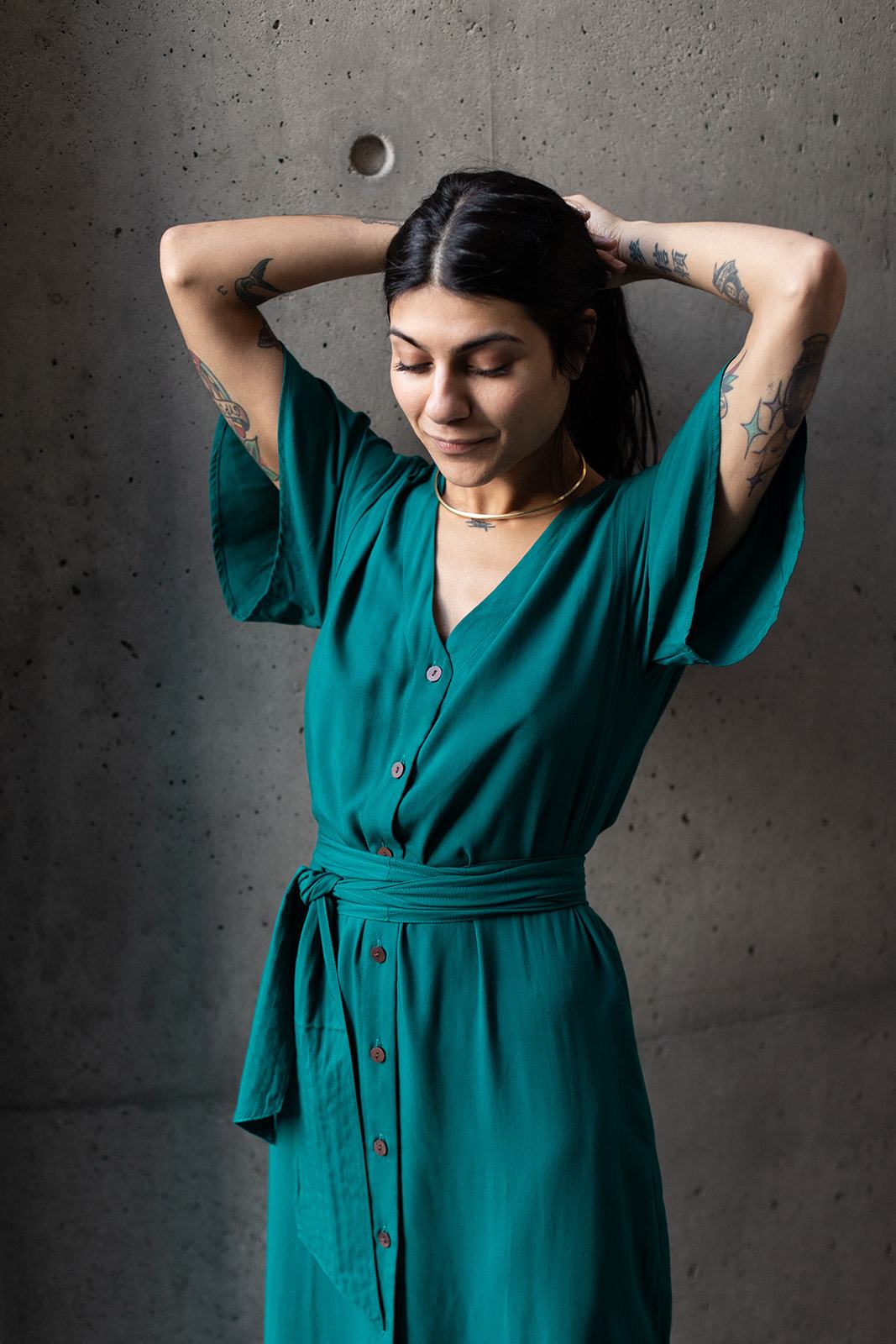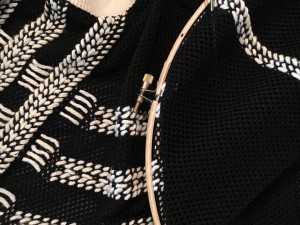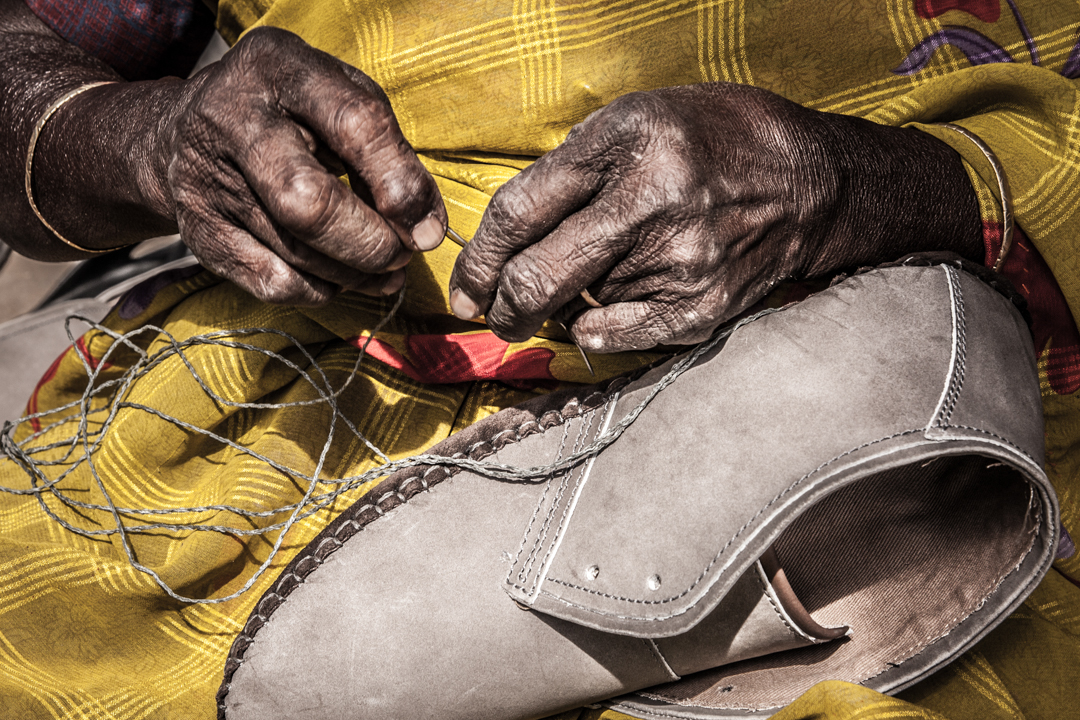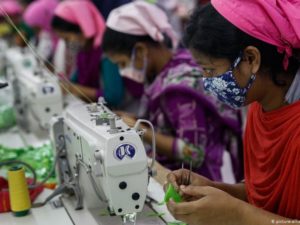As like most meetings these days, Connie Howes and I met on Zoom to discuss her three-year old clothing label Poème and all things related: running a small business whilst being a mother, sticking to one’s ethical commitments, and surviving it all in the wake of COVID.
All of Poème’s clothing is designed locally in Victoria by Howes, then relayed to a small family-run factory in Bali that employs around 60-70 artisans that take part in making her garments. They receive above Indonesian standard wages, work benefits, and are limited to regular 8-hour working days in a clearly cheerful workspace. Should you follow Fashion Revolution’s transparency awareness campaigns like #whomademyclothes, you will see Poème’s Balinese sewers holding up their response, #Imadeyourclothes.
Surprisingly, fashion design is actually Howes’ second career despite being her first love. Previously a registered acupuncturist, I asked her if she found any connection between her previous occupation and her foray into the ethical fashion world: “Yes, it’s a huge connection. But I didn’t actually recognize the connection at first. Training in Chinese medicine indoctrinates you with a certain philosophy of life that is with you forever. It’s almost like a backwards realization that things – systems – are connected.”
This unfolding holistic connectivity between her health and design worlds is largely due to what Howes’ explains as her increasing awareness that, like the body, as some parts of the fashion system become unbalanced – labour rights, untenable production speeds, and environmental degradation – other parts also become dysfunctional. Healthy systems are meant to work in tandem and are synergetic; Howes increasingly found that rebalancing these elements through different approaches resulted in a really refreshing and restorative result.
As the interview goes on, I realize that the way Howes’ has constructed Poème is more like a long-term, ongoing story between designer and producers, similar to the back-and-forth ease of conversation between good friends. Howes, still learning the ins-and-outs of the complicated ethics of sustainability and labour rights, sends her ideas, drawings, and pictures down to the artisans in Bali who then craft pieces in response to her vision, sending pieces back for Howes’ further refinement.
This relationship was a perfect accident. In the 1980s, a friend had started travelling around South America, India, and Bali, and had already been working with this family-run factory for the past 15 years to produce some of his own clothing. It was through his introduction that Howes met the matriarch of the factory and struck up a business relationship. It was, however, a clearly two-way interview: “She is one of those people that looks directly into your soul. She asked me so many questions and I felt like I was being interviewed. I wanted to work with her directly, so I went there just to meet her and make a connection. She welcomed me, but it wasn’t right away.”

Across the board, men run factories at a level grossly disproportionate to women, while women – those with vast technical skills and factory know-how – barely ascend to managerial positions. That these artisans are both represented by a woman and that their work is well-paid enough for such a two-way interview to occur is significant: women stand up for women, women get paid more, women can be increasingly choosy about the work they want to do, women have better working conditions. It’s all connected.
Howes adds comment to this very real gender disparity by pointing out the amazing ability she has through Poème to make creative and business decisions with other women rather than dealing predominantly with men. Generally in fashion, during the process of garments designed by and made for women, “you actually have no contact with the women who are making your clothes.” This is one of those system-imbalances integral to readjusting alignment again: how can women support women in creative processes if they never actually deal directly with women? How can women creatively impact the future of production if women are never in charge?
Additionally, Howes has been lucky to find fabulous coaches both in New York and LA to mentor her in different ways through the early stages of entrepreneurship. Putting her feelers out, she discovered established people in the industry that actually had the time, resources, and goodwill to pour some of their expertise into small designers trying to do things differently: they wanted to give back. This collaboration is part of what fuels Howes onward – a type of bleeding together of spiritual, personal, and business mentorships that now flow seamlessly into one another and find an outlet in the careful growth of her brand. “We’ve been able to take a lot of [this] creativity and expanded this way of thinking that’s for the betterment of the collective – and the planet – into our approach at Poème.”
Like most small businesses, the toll of COVID-19 has been rough, but unlike many small businesses whose concerns are contained to the economic climate of their immediate vicinity, Howes is deeply aware that drops in Poème’s success do not just affect her and her family: they affect the artisans in Bali as well. Howes estimates that employment numbers probably dropped from about 70 to 40 artisans during COVID due to the decline in various small-brands’ sales. Unlike large high-street brands who have notoriously abandoned massive orders and refused to pay for work done, Howes is deeply concerned about the well-being of the garment workers whose hands produce her designs. She says, “I understand being up late at night because you’re wondering about the people that have to feed their families, like, how are they? [Further] how are we [as the fashion industry] letting this happen? And how are we [the consumers] not knowing about this too?”
But is there hope in these bleak economic times, particularly when attempting to parent while running a business? This simultaneity is clearly an additional difficulty given the inaccessibility of a quiet workspace free of incessant demands and tiny hands. “My energy has been totally divided. And I want to be a good mom [amidst] a lot of unresolved feelings and a lot of confusion [relating to COVID]. I wanted my kids to feel safe, so I just dropped everything. But I’m using this opportunity to go into the brand more, refine everything, and rebrand. I’m reading more about garment workers and what was happening during COVID in developing countries and how a lot of these factory workers were not being paid for the work they’ve been doing. It’s been good for that.”
Howes has also used this time to join new collectives of ethically-minded people. For anyone paying attention these last few years, there seems to be an increase in activism and springing up of eco-communities: people are seriously considering ways of opting out of some of the capitalistic, individualist, hierarchical, and competitive features predominant in traditional business approaches. These new approaches are perhaps considered traditionally “feminine” by their collaborative, interconnected, and supportive traits, but it’s simply about giving women more space to create something better for themselves. She points out that like-minded people are starting to increasingly find each other, connect, and share resources, and that all of this is ultimately hopeful.
Does Howes have advice for other designers trying to stick to their ethical commitments? In a way. The hurdles that do not plague box-store brands during tough times – namely budgets, savings, and disregard for fabric waste – are definitely acute for small brands. However, sticking to her ethical guns has Howes content. “I have a really small budget and I’m limited with being the sole proprietor. I have to do things much more slowly, so that’s a hurdle for sure. If I want to do things right [like changing fabrics to something more sustainable] it takes a lot of time. But it’s been slow, consistent growth. It’s sustainable. And the joys of it is that it’s all a shared experience. It’s my clothes made by artisans and I take that relationship into boutiques and simply share that sentiment. Big brands try so hard to fabricate that emotional connection – something that never existed – and to create something out of nothing…[but] my process is all authentic. Really, there’s no better feeling in the world.”
You can find Poème in these spaces:
Website: https://www.poemeclothing.com/
Instagram: @poeme.clothing
Facebook: https://www.facebook.com/poemeclothing
Email: hello@poemeclothing.com




